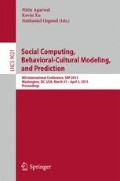Abstract
War games and military war games, in general, are extensively played throughout the world to help train people and see the effects of policies. Currently, these games are played by humans at great expense and logistically require many people to be physically present. In this work, we describe how to automatically create agents from historical data to replace some of the human players. We discuss why game-theoretic approaches are inappropriate for this task and the benefits of learning such agents. We formulate a tensor decomposition formulation to this problem that is efficiently solvable in polynomial time. We discuss preliminary results on real world data and future directions.
Access this chapter
Tax calculation will be finalised at checkout
Purchases are for personal use only
Preview
Unable to display preview. Download preview PDF.
References
Brennan, R.: Protecting the Homeland: Insights from Army Wargames. No. 1490. Rand Corporation (2002)
Davidson, I.: Knowledge Driven Clustering. In: International Joint Conference on Artificial Intelligence (IJCAI) (2009)
Davidson, I., Gilpin, S., Walker, P.: Adversarial Event Behavior and its Analysis. Journal of Knowledge Discovery and Data Mining (DMKD), November 2012
Lawson, C.L., Hanson, R.J.: Solving least squares problems. Classics in Appl. Math., No.15. SIAM, Philadelphia (1995)
Carroll, J.D., Chang, J.: Analysis of individual differences in multidimensional scaling via an N-way generalization of “Eckart-Young” decomposition. Psychometrika 35 (1970)
Kolda, T., Bader, B.: Tensor Decompositions and Applications. SIAM Review 51(3), 455–500 (2009)
Mitchell, T.: Machine Learning. McGraw Hill (1997)
Norvig, R., Russel, S.: Artificial Intelligence: A Modern Approach. Pearson (2002)
Author information
Authors and Affiliations
Corresponding author
Editor information
Editors and Affiliations
Rights and permissions
Copyright information
© 2015 Springer International Publishing Switzerland
About this paper
Cite this paper
Walker, P., Davidson, I. (2015). Learning Automated Agents from Historical Game Data via Tensor Decomposition. In: Agarwal, N., Xu, K., Osgood, N. (eds) Social Computing, Behavioral-Cultural Modeling, and Prediction. SBP 2015. Lecture Notes in Computer Science(), vol 9021. Springer, Cham. https://doi.org/10.1007/978-3-319-16268-3_22
Download citation
DOI: https://doi.org/10.1007/978-3-319-16268-3_22
Published:
Publisher Name: Springer, Cham
Print ISBN: 978-3-319-16267-6
Online ISBN: 978-3-319-16268-3
eBook Packages: Computer ScienceComputer Science (R0)

